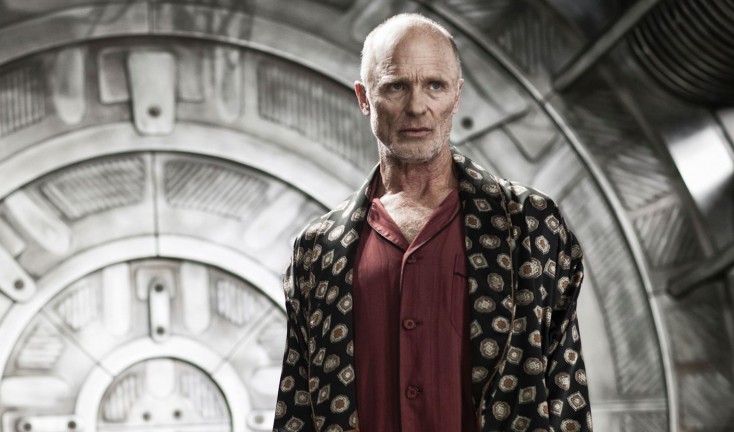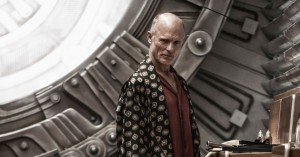By ANGELA DAWSON
Front Row Features
HOLLYWOOD—Veteran stage and film star Ed Harris appears late in Bong Joon Ho’s nightmarish fantasy drama “Snowpiercer.” He plays the enigmatic Wilford, the mysterious and much-feared engineer of a train racing across a frozen landscape after an apocalyptic event that has left the world frozen over.
The survivors are divided into classes, with the poorest relegated to the back of the train under force by armed guards. They are never allowed to mix with the better-off passengers at the front. When they revolt under the leadership of Curtis (played by “Captain America” star Chris Evans), the result is major bloodshed. Slowly but surely, the surviving rebels make their way to the front of the train in hopes of finding its mysterious leader.
Harris, a four-time Oscar nominee, says he knew little about the Korean filmmaker prior to being invited to play Wilford. After watching “The Host” and some of this other films, the New Jersey native couldn’t say no. He recently spoke about being part of the “Snowpiercer” ensemble, which includes Tilda Swinton as a ruthless enforcer, John Hurt, Octavia Spencer, Jamie Bell and Song Kang Ho in this allegorical drama about class warfare.
Q: What made you want to do this?
Harris: The Bong-man! When I was asked if I’d consider playing Wilford. I first saw “The Host,” and it just kind of blew me away. And then I saw “Mother” and then I saw “Memories of Murder,” and I said, “I want to work with this guy. I don’t care what he’s asking me to do. That was the main attraction. He seemed like an accomplished, visionary filmmaker and I just thought all of his films worked on different levels, and it would be fun to work with him.
Q: What was the most important aspect of Wilford to get right?
Harris: He’s so talked about and built up that you don’t know what to expect, but director Bong was very clear that he just wanted him to be this simple, older guy in his robe cooking dinner, almost mundane in a way. It’s kind of freaky in that way. When I got (to set), I didn’t have any preconceived notions because director Bong was very specific about what he wanted, so I was just trying to fulfill his vision of this character. There was a myriad of ways I could have played this character. I was just hoping that that choices he was encouraging to me to make would work for the movie.
Q: How did this project differ from previous films you’ve made?
Harris: This was very different for me. It was like entering director Bong’s world. It is very much his film. The fact that you call him director Bong, not Bong. Everybody calls him that. It’s a cultural thing. He’s a really nice guy and very accessible, but when you go on the set. It’s very specific. They’ve got every shot on the bulletin board and when they get the shot, they cross it out. Nothing is changed. You’re not going to do something that’s not on the board. He knew what he wanted. There was a cutter on set, cutting it as we shot the film. He’s never shooting a whole scene at one time; he’s shooting sections of it. There’s almost a reverence about it all. They’d been filming a couple of months by the time I got there so I fell into and felt comfortable being servant to his vision.
Q: What resonated with you about this movie?
Harris: It’s basically about class warfare. It’s not unlike the situation in a lot of countries including this one, in terms of the rich getting richer and the poor getting poorer. It’s about a revolution. It’s about we can’t take it anymore. So that was intriguing. It’s not a new story, in terms of that aspect of it, but it’s presented in a unique situation, in terms of this whole train business. Politically, it’s about people fighting for their own freedom and rights.
Q: Do you feel the cyclical nature of the classes is a cynical or hopeful one?
Harris: I don’t know. I never watched “Easy Rider.” I watched it the other night with my daughter. The film is 45 years old and it was a little depressing, to tell you the truth, because nothing’s really changed, in terms of intolerance and bigotry, a lack of understanding among different kinds of people. You wonder if we’re ever going to learn how to live together. Some people do but a lot of them don’t. There’s such polarity in the government right now. I don’t think the cycle is a good thing.
Q: Is there a character you’ve played that is truly yours?
Harris: “Jackknife” and “Beethoven.” “Pollack,” since I directed that one. “Sweetwater”—that was a fun character to play. Most of the roles I’ve played that are more character-y were pretty much out of my own genesis, with some guidance by the director, I guess. A lot of times, the script will dictate certain things. When you’re playing Gene Kranz (the NASA flight director in “Apollo 13”), the guy had a certain look—he had a crew cut, he’s a flight director, so you get into it. I don’t remember (director) Ron Howard telling me to play him a certain way, but I understood what his job was and where he was coming from and you could hear tapes of his voice, so you try to tell the truth with those parameters.
Q: What still excites you about your work?
Harris: I like working with people I admire, that I haven’t worked with or people that I’ve worked with that I want to work with again. I still find that the moment of creation is still exciting to me. I’m not one of these people that do the same thing take after take after take. I like to try something different, sometimes seven or eight takes. You’re just trying to penetrate the character deeper and deeper so I still find that exciting. I don’t like sitting around in my trailer for two hours while their lighting (the set). I did a play (“The Jacksonian”) in New York with my wife, Amy (Madigan), in the fall, which was really fun, a great Beth Henley play. That was really exciting and exhilarating because every night you’re performing, you’re not sitting around. You’re doing seven or eight shows a week. But it all depends on the character and what you’re doing. I worked with James Franco on this “Adderall Diaries” in Brooklyn and the guy who’s playing James as a younger man and really had a good time doing that. When I’m working I like to really work. So if I’m playing a character that’s working every day. I don’t really like going on location and working for two days and then have three days off, and then work a day —that drives me up the wall. But if it’s a good part and there are interesting people to work with, I’ll probably do it anyway.
Q: What’s up for you next?
Harris: I’m going to work with Sam Rockwell on this Neil LaBute film in August, called “Geography of Hope.” With all the great stuff going on with cable, I might get involved in a series like that. Nothing specific, but I’m totally open for doing something like that. To get to develop a character over a series of 10 episodes would be really fun.
Q: Do you want to direct again?
Harris: I love to direct. I wish I were directing something right now. It’s just about finding the right material. I shot “Appaloosa” in 2007. I can’t believe it’s been seven years since that. The years between “Pollack,” which was in 1999 and “Appaloosa,” which was ’07, that was eight years, and those eight years felt like a longer time than these past seven. The only way I know how to direct is to be compelled by the material to the point I’ve gotta do it, and I just haven’t found the story or material that is driving me that way. I hope I find it this afternoon. I really really want to direct again but I don’t want to do it to just do it. It’s nice to be in charge creatively.






